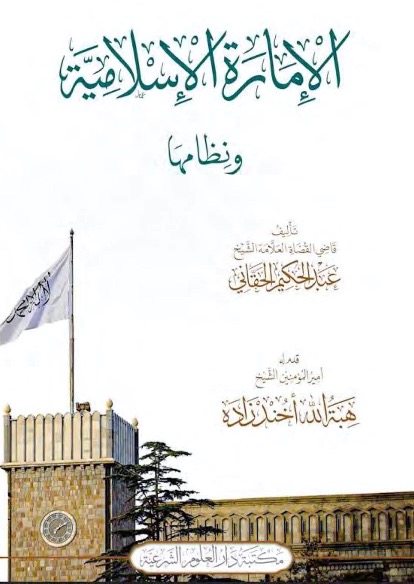 The book cover of ‘Al-Emarat al-Islamiya wa Nidhamuha’ (The Islamic Emirate and its System of Governance) was written by the Islamic Emirate’s Chief Justice, Abdul Hakim Haqqani. Photo: John Butt, X (formerly Twitter), 1 September 2023.You can preview the report online and download it by clicking the link below.
The book cover of ‘Al-Emarat al-Islamiya wa Nidhamuha’ (The Islamic Emirate and its System of Governance) was written by the Islamic Emirate’s Chief Justice, Abdul Hakim Haqqani. Photo: John Butt, X (formerly Twitter), 1 September 2023.You can preview the report online and download it by clicking the link below.
The Islamic Emirate has been described by one scholar as “a highly underspecified and under-theorised political system.” It is notable that since re-taking power, the Taleban have been ruling without a constitution. Even before that, unlike similar armed opposition groups, the Taleban never had an aligned political party to promote their policies or politics (see AAN discussion here). In their previous incarnation in government (1996-2001), they did have a manifesto of sorts, written in Pashto, ‘Taleban: Da jihad atalan da fasad dushmanan’ (Taleban: Champions of Jihad, Enemies of Corruption), but it was scarcely known to the outside world. This is why the Chief Justice’s book, with its endorsement by Emirate Supreme Leader Mullah Hibatullah Akhundzada, is so significant.
This report takes a close look at the Chief Justice’s book, which reads like a work of jurisprudence (fiqh) on Taleban policies, jurisprudence being the theory or philosophy of law. One can say that the book amounts to an exposition of what Haqqani sees as Islamic political theory, a vision of what he believes a truly ordered Islamic state should look like.
Edited by Kate Clark
* John Butt came to journalism and broadcasting from a traditional madrasa education. For the last thirty years, he has been responsible for setting up radio serial dramas – storytelling in a contemporary setting – in various countries, particularly Afghanistan: ‘New Home, New Life’ in the 1990s and more recently a cross-border radio drama called Da Pulay Poray.
The first publication in this mini-series looked at the decrees, edicts and instructions issued by the Taleban’s supreme leader, Mullah Hibatullah Akhundzada. The orders themselves can also be read in their original Pashto and Dari, as well as AAN’s unofficial English translation.
You can preview the report online and download it by clicking the link below.
REVISIONS:
This article was last updated on 3 Sep 2023
 Afghanistan Peace Campaign
Afghanistan Peace Campaign
